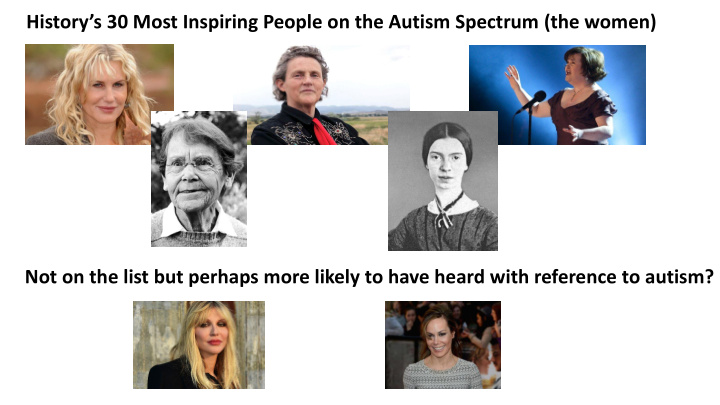



History’s 30 Most Inspiring People on the Autism Spectrum (the women) Not on the list but perhaps more likely to have heard with reference to autism?
“I think being a woman is hard. Being an autistic woman is even harder” Rose Hughes • Gender bias in screening & stereotypes (based on male characteristics) • Apparent higher social motivation and greater capacity for traditional friendships – but based on analytical thinking and strategies such as rote learning, imitation, scripts, masking and camouflaging with better language skills • Ability to camouflage social difficulties in social situations, on periphery, led by others • Quiet / passive behaviours more acceptable for girls • ‘Special’ interests may be less obvious (more ‘normal’) but more intense than peers • Better imagination, pretend play but maybe escapism or scripted • Less obvious ‘physical’ characteristics e.g. repetitive & ritualistic behaviours • Internalising behaviours rather than externalising • Diagnostic overshowing – coexisting conditions may be part of autism presentation • Assessment based on traditional ‘male’ presentation and so females missed in terms of recognition and diagnosis with the ensuing explanation, help and support • ‘Misdiagnosis or missed diagnosis’ - Impacts
“Empowering women and girls with autism” United Nations What is the experience of being a women with autism? In your group discuss your own experiences
References Dean, M. Harwood, R & Kasari, C. (2017). The art of camouflage: gender differences in the social behaviours of girls and boys with autism spectrum disorder. Autism 21 (6) pp678-689. Gould, J. & Aston-Smith, J. (2011). Missed diagnosis or misdiagnosis: girls and women on the spectrum. Good autism practice 12 (1) pp34-41. Nasen. (2016). Girls and autism: Flying under the radar . Tamworth: Nasen
Interesting article with 6 women with autism www.bbc.co.uk/news/resources/idt- sh/women_late_diagnosis_autism NAS information on women and girls with autism – the second one in particular has some links to interesting articles www.autism.org.uk/womensday http://www.autism.org.uk/about/what-is/gender.aspx
Recommend
More recommend